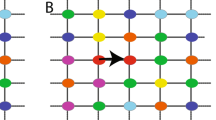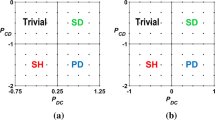Abstract
As our understanding of biological evolution continues to deepen, tension still surrounds the relationship between competition and cooperation in the evolution of the biosphere, with rival viewpoints often associated with the Red Queen and Black Queen hypotheses respectively. This essay seeks to reconcile these viewpoints by integrating observations of some general trends in biosphere evolution with concepts from game theory. It is here argued that biodiversity and ecological cooperation are intimately related, and that both tend to cyclically increase over biological history; this is likely due to the greater relative stability of cooperation over competition as a means of long-term conflict resolution within ecosystems. By integrating this view of the biosphere with existing models such as Niche Game Theory, it may be argued that competition and cooperation in ecosystems coexist at equilibria which shift preferentially towards increasing cooperation over biological history. This potentially points to a state of “cooperative equilibrium” as a limit or endpoint in long-term biosphere evolution, such that Black Queen and Red Queen behavior dominate different phases in an evolutionary movement towards optimal cooperative stability in ecological networks. This concept, if accepted, may also bear implications for developing future mathematical models in evolutionary biology, as well as for resolving the perennial debate regarding the relative roles of conflict and harmony in nature.
Similar content being viewed by others
Data Availability
All materials cited are available in academic databases, university libraries, or free online sites, as of the time of writing, or may be purchased. Some original source materials were unavailable to the author, who was thus obliged to rely on direct or indirect citations garnered from other sources, as outlined in the text and references.
Code Availability
Not applicable.
References
Ackland GJ, Gallagher ID (2004) Stabilization of large generalized Lotka–Volterra foodwebs by evolutionary feedback. Phys Rev Lett 93(15):158701.1–158701.4. https://doi.org/10.1103/PhysRevLett.93.158701
Agrawal AA, Ackerly DD, Adler F, Arnold AE, Cáceres C, Doak DF, Post E, Hudson PJ, Maron J, Mooney KA, Power M, Schemske D, Stachowicz J, Strauss S, Turner MG, Werner E (2007) Filling key gaps in population and community ecology. Front Ecol Environ 5(3):145–152. https://doi.org/10.1890/1540-9295(2007)5[145:FKGIPA]2.0.CO
Billington E (1968) Understanding ecology. Frederick Warne and Co., New York
Bonner JT (1988) The evolution of complexity by means of natural selection. Princeton University Press, Princeton
Bruno JF, Stachowicz JJ, Bertness MD (2003) Inclusion of facilitation into ecological theory. Trends Ecol Evol 18(3):119–125. https://doi.org/10.1016/s0169-5347(02)00045-9
Chisholm RA (2010) Exponential growth in invasion biology. (Book review of Davis, MA (2009) Invasion biology, Oxford University Press, Oxford, UK.). BioScience 60(4):314–315. https://doi.org/10.1525/bio.2010.60.4.10
Dawkins R (1976) The selfish gene. Oxford University Press, Oxford
de Vries S, de Vries J, von Dahlen JK, Gould SB, Archibald JM, Rose LE, Slamovits CH (2018) On plant defense signaling networks and early land plant evolution. Commun Integr Biol 11(3):1–14. https://doi.org/10.1080/19420889.2018.1486168
Dobretsov N, Kolchanov N, Rozanov A, Zavarzin G (2007) Biosphere origin and evolution. Springer Publishing, Boston. https://doi.org/10.1007/978-0-387-68656-1
Douglas AE (2010) The symbiotic habit. Princeton University Press, Princeton
Ekimova I, Valdes A, Chichvarkhin A, Antokhina T, Lindsay T, Schepetov D (2019) Diet-driven ecological radiation and allopatric speciation result in high species diversity in a temperate-cold water marine genus Dendronotus (Gastropoda: Nudibranchia). Mol Phylogenet Evol 141:106609. https://doi.org/10.1016/j.ympev.2019.106609
Ekstig B (2015) Complexity, natural selection and the evolution of life and humans. Found Sci 20(2):175–187. https://doi.org/10.1007/s10699-014-9358-y
Eldredge N, Gould SJ (1972) Punctuated equilibria: an alternative to phyletic gradualism. In: Schopf TJM (ed) Models in paleobiology. Freeman, Cooper and Cy, San Francisco, pp 82–115
Fort H (2008) A minimal model for the evolution of cooperation through evolving heterogeneous games. Europhys Lett 81(4):48008. https://doi.org/10.1209/0295-5075/81/48008
Fort H (2020) Combining niche and game theories to address interspecific cooperation in ecological communities. Community Ecol 21(1):13–24. https://doi.org/10.1007/s42974-020-00006-7
Guerrero R, Berlanga M (2016) From the cell to the ecosystem: the physiological evolution of symbiosis. Evol Biol 43:543–552. https://doi.org/10.1007/s11692-015-9360-5
Harvey BP, Al-Janabi B, Broszeit S, Cioffi R, Kumar A, Aranguren-Gassis M et al (2014) Evolution of marine organisms under climate change at different levels of biological organisation. Water 6(11):3545–3574. https://doi.org/10.3390/w6113545
Hening A, Nguyen DH (2018) Persistence in stochastic Lotka–Volterra food chains with intraspecific competition. Bull Math Biol 80(10):2527–2560. https://doi.org/10.1007/s11538-018-0468-5
Hine R (ed) (2019) “Gaia Hypothesis” from A dictionary of biology, 8th edn. Oxford University Press, Oxford. https://doi.org/10.1093/acref/9780198821489.001.0001
Kauffman S (2000) Investigations. Oxford University Press, New York
Kauffman S (2013) Evolution beyond Newton, Darwin, and entailing law: the origin of complexity in the evolving biosphere. In: Lineweaver CH, Davies P, Ruse M (eds) Complexity and the arrow of time. Cambridge University Press, Cambridge. ProQuest Ebook Central. http://ebookcentral.proquest.com/lib/purdue/detail.action?docID=1303669
Kiers ET, West SA (2015) Evolving new organisms via symbiosis. Science (AAAS) 348(6233):392–394. https://doi.org/10.1126/science.aaa9605
Kiers E, Duhamel M, Beesetty Y, Mensah J, Franken O, Verbruggen E et al (2011) Reciprocal rewards stabilize cooperation in the mycorrhizal symbiosis. Science 333(6044):880–882. https://doi.org/10.1126/science.1208473
Kropotkin PA (1902) Mutual aid; a factor of evolution, by P. Kropotkin. William Heinemann, London, England. https://hdl.handle.net/2027/dul1.ark:/13960/t1bk6qd1v
Lamichhaney S, Han F, Webster M, Andersson L, Grant B, Grant P (2018) Rapid hybrid speciation of Darwin’s finches. Science 359(6372):224–227. https://doi.org/10.1126/science.aao4593
Lineweaver CH, Davies P, Ruse M (eds) (2013) Complexity and the arrow of time. Cambridge University Press, Cambridge, UK. ProQuest Ebook Central. https://ebookcentral.proquest.com/lib/purdue/reader.action?docID=1303669
Lovelock JE (1989) Geophysiology, the science of Gaia. Rev Geophys 27(2):215–222. https://doi.org/10.1029/RG027i002p00215
Lovelock JE, Margulis L (1974) Atmospheric homeostasis by and for the biosphere: the Gaia hypothesis. Tellus 26(1–2):2–10. https://doi.org/10.3402/tellusa.v26i1-2.9731
Markos A, Svorcova J (2019) Epigenetic processes and the evolution of life. CRC Press, Boca Raton
Maynard Smith J, Szathmary E (1995) The major transitions in evolution. Oxford University Press, Oxford
McGhee GR, Muller GB, Wagner GP, Pradeau T, Schafer K (2011) Convergent evolution: limited forms most beautiful. MIT Press, Cambridge, MA. ProQuest Ebook Central. https://ebookcentral.proquest.com/lib/purdue/detail.action?docID=3339309
Mitteldorf JJ (2012) Adaptive aging in the context of evolutionary theory. Biochemistry (Moscow) 77(7):716–725. https://doi.org/10.1134/s0006297912070036
Moran NA (2006) Symbiosis. Curr Biol 16(20):R866–R871. https://doi.org/10.1016/j.cub.2006.09.019
Morris JJ, Johnson ZI, Szul MJ, Keller M, Zinser ER (2011) Dependence of the cyanobacterium Prochlorococcus on hydrogen peroxide scavenging microbes for growth at the ocean’s surface. PLoS One 6(2):e16805. https://doi.org/10.1371/journal.pone.0016805
Morris JJ, Lenski RE, Zinser ER (2012) The Black Queen Hypothesis: evolution of dependencies through adaptive gene loss. mBio 3(2):e00036-12. https://doi.org/10.1128/mbio.00036-12
Odling-Smee GJ, Laland KN, Feldman MW (2003) Niche construction: the neglected process in evolution. Princeton University Press, Princeton
Onori L, Visconti G (2012) The GAIA theory: from Lovelock to Margulis: from a homeostatic to a cognitive autopoietic worldview. Atti Della Accad Naz Dei Lincei Rend Lincei Sci Fis E Nat 23(4):375–386. https://doi.org/10.1007/s12210-012-0187-z
Paley W (1802) Natural theology. Wilks & Taylor, London
Prosdocimi F, José MV, de Farias ST (2020) The theory of chemical symbiosis: a Margulian view for the emergence of biological systems (origin of life). Acta Biotheor. https://doi.org/10.1007/s10441-020-09388-7
Ramos SE, Schiestl FP (2019) Rapid plant evolution driven by the interaction of pollination and herbivory. Science 364(6436):193–196. https://doi.org/10.1126/science.aav6962
Roughgarden J (2009) The genial gene: deconstructing Darwinian selfishness. University of California Press, Berkeley
Sachs JL, Hollowell AC (2012) The origins of cooperative bacterial communities. mBio 3(3):e00099-12. https://doi.org/10.1128/mBio.00099-12
Sagan L (1966) On the origin of mitosing cells. J Theor Biol 14(3):225–274. https://doi.org/10.1016/0022-5193(67)90079-3
Stachowicz JJ (2011) Symbiosis (book review of Douglas, AE (2010) The symbiotic habit. Princeton University Press, Princeton, NJ.). BioScience 61(4):326–327. https://doi.org/10.1525/bio.2011.61.4.16
Tyrrell T (2013) On Gaia: a critical investigation of the relationship between life and Earth. Princeton University Press, ProQuest Ebook Central. https://ebookcentral.proquest.com/lib/purdue/detail.action?docID=1184270
Van Valen L (1973) A new evolutionary law. Evol Theor 1(1):1–30
Vermeij GJ, Roopnarine PD (2013) Reining in the Red Queen: the dynamics of adaptation and extinction reexamined. Paleobiology 39(4):560–575. https://doi.org/10.1666/13009
Vernadsky VI (1926) The biosphere. Nauchnoe khimiko-technicheskoye izdatel’stvo, Leningrad, Russia (in Russian)
von Vaupel Klein JC (1994) Punctuated equilibria and phyletic gradualism: even partners can be good friends. Acta Biotheor 42:15–48. https://doi.org/10.1007/BF00706838
Acknowledgements
Special thanks belong to Dr. F. Jacobs and to two anonymous reviewers for their insightful and helpful criticism, and also to Benjamin Culver and Pietro Stroik for their support. This work would have been impossible without access to the Purdue University Library Database, for which the author is very grateful. The author does not commit any of those acknowledged to adherence to the views expressed in this paper. AMDG.
Funding
This essay was not funded by any organization or individual. The author did not make use of any University funding or assistance aside from Purdue University database access, library access, and other educational opportunities afforded by the University generally. This project is not affiliated directly with Purdue University, and the author retains responsibility for this essay.
Author information
Authors and Affiliations
Contributions
Not applicable.
Corresponding author
Ethics declarations
Conflict of interest
The author declares that he has no conflict of interest.
Ethical Approval
Not applicable.
Consent to Participate
Not applicable.
Consent for Publication
Not applicable.
Additional information
Publisher's Note
Springer Nature remains neutral with regard to jurisdictional claims in published maps and institutional affiliations.
Rights and permissions
About this article
Cite this article
Herring, J. Cooperative Equilibrium in Biosphere Evolution: Reconciling Competition and Cooperation in Evolutionary Ecology. Acta Biotheor 69, 629–641 (2021). https://doi.org/10.1007/s10441-021-09409-z
Received:
Accepted:
Published:
Issue Date:
DOI: https://doi.org/10.1007/s10441-021-09409-z




